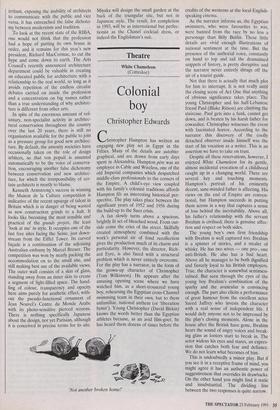Theatre
White Chameleon (Cottesloe)
Colonial boy
Christopher Edwards
hristopher Hampton has written an engaging new play set in Egypt in the Fifties. Many of the details are autobio- graphical, and are drawn from early days spent in Alexandria. Hampton pere was an employee in Cable and Wireless, one of the old Imperial companies which despatched middle-class professionals to the corners of the Empire. A child's-eye view coupled with his family's colonial traditions affords Hampton fi/s an interesting historical per- spective. The play takes place between the significant years of 1952 and 1956 during the build-up to the Suez crisis.
A fan slowly turns above a spacious, brightly lit set of bleached wood. From out- side come the cries of the street. Skilfully created atmosphere combined with the work's personal air of fond recollection gives the production much of its charm and particularity. However, the director, Rich- ard Eyre, is also faced with a structural problem which is never entirely overcome. For the play has a narrator, in the form of the grown-up character of Christopher (Tom Wilkinson). He appears after the amusing opening scene where we have watched him, as a short-trousered young boy, rehearsing the Egyptian cross-Channel swimming team in their own, but to them unfamiliar, national anthem (or 'liberation hymn'). Young Christopher (David Birkin) knows the words better than the Egyptian athletes because, as an avid film-goer, he has heard them dozens of times before the 'Not another broken home!' credits of the westerns at the local English- speaking cinema.
As the narrator informs us, the Egyptian swimmers, who were favourites to win, were banned from the race by no less a personage than Billy Butlin. These little details are vivid enough illustrations of national sentiment at the time. But the presence of the authorial voice, constantly on hand to top and tail the dramatised snippets of history, is pretty disruptive and the narrator never entirely shrugs off the air of a tourist guide.
Not that there is actually that much plot for him to interrupt. It is not really until the closing scene of Act One that anything of obvious significance takes place. The young Christopher and his half-Lebanese friend Paul (Blake Ritson) are climbing the staircase. Paul gets into a funk, cannot get down, and is beaten by his harsh father for cowardice. Christopher witnesses the event with fascinated horror. According to the narrator this discovery of the coolly detached observer inside himself was the start of his vocation as a writer. This is an assertion we have to take on trust.
Despite all these reservations, however, I enjoyed White Chameleon for its gentle, almost incidental evocation of a childhood caught up in a changing world. There are several key and touching moments. Hampton's portrait of his eminently decent, sane-minded father is affecting. His views on the end of Empire are conven- tional, but Hampton succeeds in putting them across in a way that captures a sense of loss behind the inevitability. Above all, his father's relationship with the servant Ibrahim is civilised; there is genuine affec- tion and respect on both sides.
The young boy's own firm friendship with Ibrahim is well captured too. Ibrahim is a spinner of stories, and a stealer of whisky. He has two wives — one pro-, one anti-British. He also has a bad heart. Above all he manages to be both dignified and fiercely loyal to his British employers. True, the character is somewhat sentimen- talised. But seen through the eyes of the young boy Ibrahim's combination of the sparky and the avuncular is convincing enough. The part also elicits a performance of great humour from the excellent actor Saeed Jaffrey who invests the character with a real sense of independent life. I would defy anyone not to be impressed by the play's closing moments. Alone in the house after the British have gone, Ibrahim hears the sound of angry voices and break- ing glass as looters start to break in. The actor widens his eyes and stares, an expres- sion that catches both fear and defiance. We do not learn what becomes of him.
This is undoubtedly a minor play. But if you see it in a receptive frame of mind, you might agree it has an authentic power of suggestiveness that overrides its drawbacks. On the other hand you might find it static and insubstantial. The dividing line between the two responses is quite narrow.


















































 Previous page
Previous page